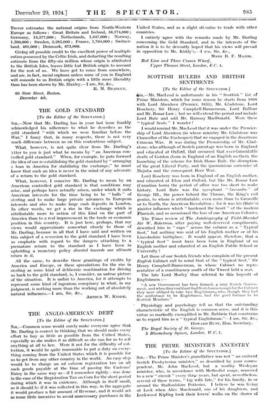SCOTTISH RULERS AND BRITISH SENTIMENTS
[To the Editor of the SPECTATOR.]
,Sin,—Mr. MacLeod is unfortunate in his " Scottish " list of Prime Ministers, which for some reason he starts from 1806 with Lord Aberdeen (Premier, 1852), Mr. Gladstone, Lord Rosebery, Sir Henry Campbell-Bannerman, Lord Balfour and Mr. Bonar Law ; but we will extend the period and include Lord Bute and add Mr. Ramsay MacDonald. Were these "typical Scots" I wonder !
I would remind Mr. MacLeod that it was under the Premier- ship of Lord Aberdeen (in whose ministry Mr. Gladstone was Chancellor of the Exchequer) that We engaged in the disastrous Crimean War. It was during the Premiership of Mr. Glad-
stone, who although of Scotch parentage was born. in England and educated at Oxford, that occurred that ever-lamentable death of Gordon (born in England of an English mother), the
launching of the scheme for Irish Home Rule, the disruption of the great Liberal Party, and the ignominious surrender at Majuba and the consequent Boer War.
. Lord Rosebery was born in ,England of an English mother, and educated at Eton and Oxford, but like Mr. Bonar Law (Canadian born) the period of office was too short to make history. Lord Bute was the sycophant " favourite" of George III., the power behind the Throne, the King's evil genius, to whom is attributable, even more than to Grenville or to North, the American Revolution ; for it was his (Bute's) sinister influence which "hardened the heart" of the modern Pharaoh, and so occasioned the loss of our American Colonies.
The Times review of The Autobiography of Field-Marshal Sir W. Robertson, after paying well-deserved compliments, described him in "caps " across. the column as a "Typical
Scot," but nothing was said of his English mother or of his Lincolnshire birthplace. - It would appear, therefore, that a "typical Scot" must have been born in England of an English mother and educated at an English Public School or University !
Let those of our Scotch friends who complain of the present English Cabinet call to mind that of the "typical Scot," Sir
Henry Campbell-Bannerman, in whose. Cabinet no repre- sentative of a constituency south of the Tweed held a seat.
The late Lord Morley thus referred to this boycott of Englishmen :-
"A new Government has been formed, a very Scotch Govern- ment, and when they could not find Scotchmen enough for the Cabinet they wore obliged to take two Eng:ishmen, who, though they had tho misfortune to be Englishmen, had the good fortune to be Scottish Members."
Physiology and psychology tell us that the outstanding characteristic Of the English is common sense, and it is this virtue so markedly exemplified in Mr. Baldwin that constrains us to regard him as a "typical Englishman."—! am, Sir, &c.;
HOWARD RUFF, HOIL Secretary. "
The Royal Society of St. George, 5 Bloomsbury Square, London, W.C. 1.










































 Previous page
Previous page